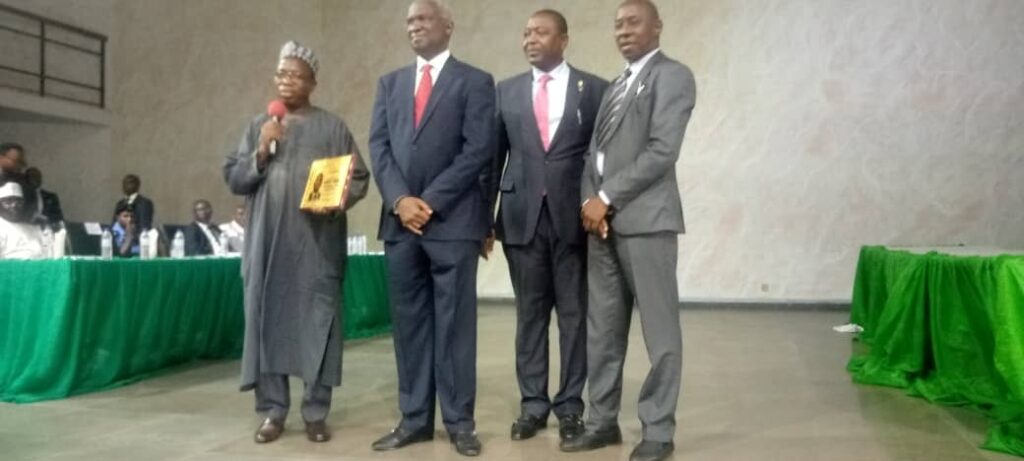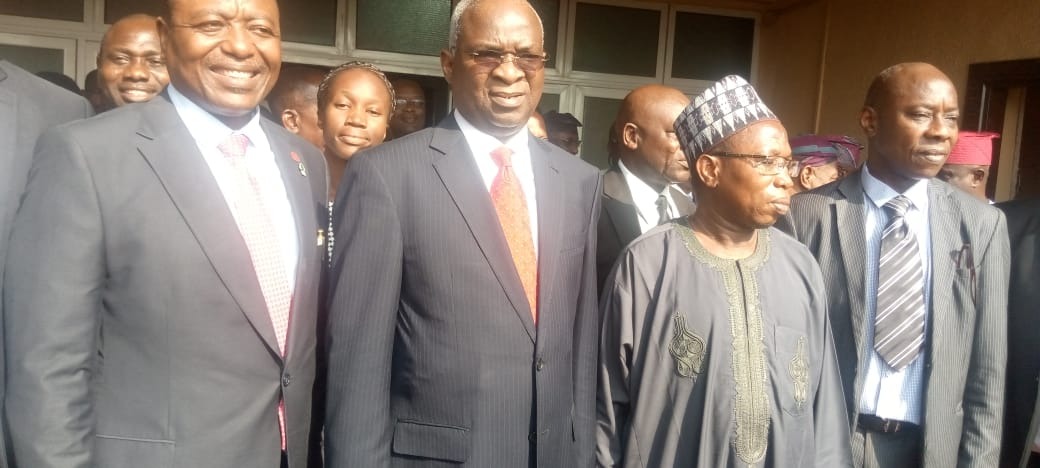
posted November 9, 2023
Immediate past Minister of Works, Mr. Babatunde Raji Fashola, SAN, has emphasized the imperative of recognizing and celebrating public figures whose contributions have helped to shape the cause of human progress, both in their individuals and professional capacity, noting that the late Justice Chukwuweike Idigbe is one of such sterling examples.
Fashola, who also was a former Governor of Lagos State, highlighted that a social contract between citizens and the government is needful as a crucial reminder that our responsibilities go hand in hand with the rights we enjoy in a society.
Fashola spoke while delivering a keynote paper at the 19th Justice Idigbe Memorial Lecture title: “Duty And Citizenship – The Social Contract” Tuesday, at the University of Benin (UNIBEN), Auditorium.
Chukwunweike Idigbe (1923-1983) was appointed to the position of a Justice of the Supreme Court of Nigeria. on April 10, 1964 and served meritoriously until retirement. He also, served as Chief Justice of the Mid west Region.
According to Fashola, it is necessary to honour those who have left a lasting impact on society, saying that Justice Chukwuweike Idigbe was a remarkable figure, not just in the legal field but also as a citizen who served with dedication and a sense of duty to the nation, at large.
Fashola said when he was invited to be part of the Idigbe memorial lecture early this year, and asked to review the life and times of the late justice, he was especially delighted but humbled by the impactful life of the subject, and also, his belief that true protection of rights and the assertion of one’s place in society comes from a foundation of selfless service and duty to both private and public causes, which Idigbe exemplified.

Addressing the audience, the Guest Lecturer recalled with nostalgia: “I was here about three decades ago when the first Idigbe memorial lecture was delivered by no less a personage than the Honourable Kayode Eso, JSC in 1985, and I sat where many of you are seating today listening with rapt attention to every word and made sure I did not leave the hall until I got a printed copy of the lecture which I am sure I still have but cannot currently find.
“This is part of the contest that underpins my delight to be here today as a Lecturer in honour of a truly outstanding Nigerian, jurist, patriot, the late Justice Chukwunweike Idigbe, who sadly left us on 31st July 1983, about 43 years ago.
What then was it about this Nigerian whose legacy remain imperishable? To answer the question, Fashola said the late Idigbe was many things: one, from a family that continue to celebrate him, to colleges whose professional trust and respect he earned, to success as a professional who was fairly rewarded as a legal practitioner as he was not poor.
“But perhaps the reason for Idigbe’s reverence and celebration in life and in death was his service and sense of duty to Nigeria and his fellow citizens”, the former Works Minister stated, declaring that was why he exercises the latitude to choose his topic, to title his speech: Duty and Citizenship – The Social Contract,” because the late jurist was a dutiful citizen and a worthy Nigerian patriot.
He said when he was invited to intervene at the memorial lecture, he was also asked to review the judgement of the late Idigbe in the case of Bucknor-Maclean vs Inlaks reported in (1980) 8 11 SC 1, a case he enthused, demonstrated Justice Idigbe’s humanity, companion, sense of justice and fairness to his fellow citizens.
He pointed out that on the surface of it, it looked like just another case about the interpretation of Section 14 the Registration of Titles Act, and the matter seemed foreclosed because the Supreme Court had decided cases like She’ll BP Petroleum Company vs Mammal Engineering Nigeria Ltd 1974 (1 ALL NLR 542) and Owunmi v Patterson Zochonis & Co Nigeria Ltd (1 ALL NLR 107).
These cases had been decided that any transfer of title under the Registration of Titles Act, shall use the Form prescribed under the Act to be valid but people came to challenge the validity of the interest created in land under the Act.

Those who came to challenge the validity of the Act were successors of the person who created the interest. In other words, they sought to nullify an interest they had created by relying on the non-compliance that they had been part of by collecting money which smelt of fraud at the worst and inequity at its fairest.
However, Fashola said Idigbe would not have none of it and proceeded to persuade a full panel of the Supreme Court to reverse their previous decisions which were binding precedents and constraints to doing justice in the case under consideration. Needless to say, “all his brother Justices unanimously agreed with him. Idigbe, JSC enforced the law by using, and this is one of our duties as citizens.”
To Fashola, that singular act of Idigbe has a significant connection with the title of the lecture, Duty, Citizenship and the Social Contract; which is the relationship between the state, and the government on one hand, and the citizen on the other hand.
He pointed out that just as contract, as implied, confers certain expectations and benefits on citizens, it also required in exchange for citizens to render certain services to the state as enshrined in Chapter 2 Section 24 of the 1999 Constitution as amended.
Fashola said that Idigbe helped in shaping discussion on citizens contributing positively to their communities and upholding their duties as especially relevant, noting that the call to take ownership of our national identity and narrative is powerful. He remarked that we can’t throw stones at our home and expect it to flourish. Instead, we should strive to build and amplify the positive aspects of our country.
The guest speaker also, expressed that some of the issues raised about the national flag and anthem misuse, as well as the need for responsible expression on social media, are pertinent in today’s context. It’s a call for a collective effort to uplift our nation and create a society that values justice, equity, and the rule of law.
Others he mentioned are: making positive and useful contributions to the advancement, progress and well-being of the community where one resides; render assistant to appropriate and lawful agencies in the maintenance of law and order; and to declare one’s income honestly, help lawful agencies and pay one’s tax promptly.
Examining the above and the level of compliance, Mr. Fashola noted the flagrant use of colours of green and white on the national flag in Government offices with a coat of arms place in the white portion of the flag is not supposed to be.
Similarly, he said the attempts to attach colourful embroidery to the flag is wrong as it desecrates rather than respect the flag.
On power, prestige and good name of Nigeria, he observed that as citizens, we often demarket the country through cynical remarks which tend to undervalue it by the negative conduct of some citizens.
“The point I make is that we can be angry with our government and with representatives of government, we can condemn them in the strongest words, after all that is a right to expression subject to the limits of the law of defamation. However, our disagreements, discontent or displeasure with government is no reason to scandalize Nigeria.
Nigeria has not offended us; let me accept that out Governments and office holders may have more to do to make us happy. But no person who seeks greatness throws stone at their home.
Some of the grievance has been expressed in words so the effect that Nigeria is not a nation. While I respect the rights of those who hold that view, I hold a different view.
Also speaking on positive contribution to the community, rendering assistance to law enforcement agencies in the maintenance of law and order, as well as declaration of one’s income tax promptly, he said communities help to shape conduct and behaviour of those within and ultimately defines quality of lives of those living therein.
According to him, the constitution demands of us the duty to usefully contribute to the well-being of our community; because the same way that poverty, disease and squalor can be propagated from the within a community, so can prosperity, wellness and cleanliness can be created from communities.
He further observed that even as the Constitution requires citizens to render assistance to law enforcement agencies in the maintenance of law and order, some people do not see any reason why they should do so.
To buttress his argument, he told of a shocking breach of this duty which was reported recently of some members of a community who reportedly attacked officers of the Nigerian Drug Law Enforcement Agency (NDLEA) who were trying to effect the arrest of a drug suspect without thinking of the damage that those who peddle illicit drug do to society by way of acquiring wealth without real work to undermine societal value and virtue of the industry, or by way of damage to the young ones who become dependent and addicted and unable to contribute to national development.
To Fashola, declaration of income an prompt payment of tax is a duty prescribe for every income earning citizen to perform as it affords government at all levels the means to perform its functions effectively in every given society.
He said like every other duties earlier highlighted, payment of tax is a constitutional duty and not just one imposed by any ordinary legislation. According to him, like the other duties that he has discussed, government and citizens which is the heart of social contract, is a two-way relationship which involves give and take.
Furthermore, he said it is a misnomer to sing the National Anthem for a governor or anybody during ceremonies because they are not sovereign, noting that it is only for visiting heads of states, foreign missions or international events like football which the country has representatives.
In her speech, the Vice-chancellor, University of Benin, Prof. Lilian Salami commended the law faculty of the institution for organising the memorial lecture which she said was insightful.
The Vice-chancellor who was represented by the Deputy Vice Chancellor (DVC), Ekheuan Campus, Prof. Buniyamin Ayinde, said there was no doubt that the late Justice Idigbe contributed immensely to society and the law profession.
He said, “I appreciate the contributions of Justice Idigbe to the law profession which we are celebrating today. In fact, he deserved to be celebrated because he was a man of honour who stands tall irrespective that he was no more with us today.
Prof. Ayinde also appreciated the guest lecturer, Babatunde Fashola for being a good ambassador of the institution, adding that when he was delivering the lecture, her mind went back to National Pledge which is usually recited and the need to stand by the Pledge and that through that society will be better.
Speaking on behalf of the Idigbe family, the immediate past Minister of state for Budget and Planning, Prince Clem Agba, thanked the organizers for keeping the lecture series alive because Justice Idigbe was not just a quintessential jurist but a fearless advocate of the rule of law who gave the best interpretation in various human endeavours.
“Justice Idigbe had the unique opportunity of traversing the legal profession like a colossus and he was not just a jurist per excellence but an advocate for equity, justice and fair application of the rule of law.
He was renowned for his first-class landmark judgement which has continue to shape legal landscape of Nigeria to this day. I therefore commend the organizers of the lecture which we are celebrating today because Justice Idigbe left a legacy which the people admire”, declared Prince Agba.

